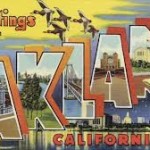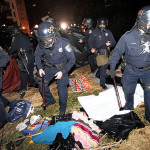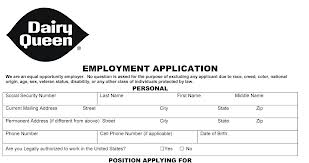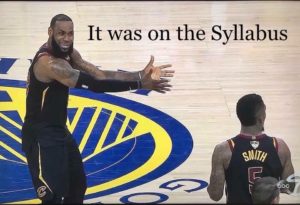
Fall 2017 Journalism Department
San Francisco State University
Roland De Wolk, Senior Lecturer
This will be a rigorously demanding course. Some students who have survived it have called it “exacting” and “exhausting.” At least one called it “cruel.” Those were the polite reviews.
But I am trying to be a kinder, gentler teacher, so let’s see how that goes.
You may need it to graduate with a journalism degree. If you pass this course, you will have earned it. You may not need this course to graduate. I intend to make this one of the most rewarding experiences in the department. Some journalism professors liken the reporting class it to boot camp. If so, this particular section is Parris Island. (http://www.mcrdpi.usmc.mil/)
Here’s the pay-off: Those of you who survive will be miles ahead of the competition to become news reporters. Those of you who rise to the level I will expect of you and thrive will emerge light-years ahead. The journalism industry is a wonderful period of great turmoil and tumult and you — the first native-born generation of post-print journalism scholars — will need tools, skills and vision never before demanded of the profession.
In short: Those of you meant to be news reporters will love this course for what it will demand of you and what it will return to you. Those who choose not to stay will be grateful they stopped wasting their time and went on to professions that pay a living wage.
Here are the official guidelines from the Journalism Department:
Prerequisites

You Used To be Able To Buy This at Walmart. Now You Have To Pay Tuition.
To enroll in this course, the department requires students to complete Journalism 221 Newswriting with minimum grade of C here or an equivalent class at another accredited college with a minimum grade of C. Additional prerequisites: English language proficiency and ability to type at least 25 WPM.
Department Summary
This course is designed to substantially improve and expand the news gathering and writing skills of students who have successfully completed Newswriting. Students may do extensive research using the neighborhoods of San Francisco and Oakland as their beat communities. Other beats are possible depending on circumstances.
Each student will likely choose one of these neighborhoods. It may be a community convenient to their home but not a community in which they live or have lived. Most assignments will be done in that neighborhood. Stories will be written as though the student was a reporter for an excellent news outlet covering that area or theme with timely, daily — if not hourly — stories. Sustained coverage of one neighborhood will give students a chance to learn what it is like to be a reporter in a new town, on a new beat.
Assignments will likely include, but are not limited to, coverage of the following: a meeting, a crime, a breaking news event, a profile and a final story on an issue or trend or something the instructor deems worthy.
This is a demanding course that requires each student to spend the equivalent of at least a full day on his or her beat. Another day of research including phone calls, document searches and interviews as well as writing and rewriting are normal for those who earn a passing grade.
Please add online@
Targets
Target skills each student should understand and develop during this course:
— Obsessive attention to accuracy
— Developing sources
— Use of access laws — public meetings, courts and other records
— Deadline writing
— Becoming familiar with neighborhood organizations and community groups
— Story idea development
— Looking for ways to localize national stories and to find the local angle for regional, national and international stories
— Document searches
— Beat coverage
— Specialized reporting
— Story organization and structure
— Writing profiles
— Use of charts, maps, surveys, studies and polls
— Writing for on-line publications and maybe print
— Learning how to revise stories in response to instructor and peer critiques
— Providing fellow students with feedback and advice
It is assumed students in this course already have learned the target skills in Newswriting (Jour. 221): Accuracy, news judgment, clear and graceful writing, use of quotes, attribution, use of transitions, listening, use of basic research tools, interviewing, editing and rewriting, deadline writing, note-taking, research planning, use of multiple sources, current events knowledge, libel knowledge, use of statistics. Far too often students are not prepared for the demands of this class and rather than fail them, I will be honest with about whether they are ready for this section.
Instructional Methods
Throughout the course there will be an emphasis on both the gathering of material for a story and on the writing of the story. Students will learn how to gather both facts and ideas and will learn how to write stories that are accurate, clear, informative and interesting.
There will be a strong emphasis in this course on developing a high level of professional competency. In addition to an emphasis on developing the technical and judgment skills needed for fine reporting, this course will also emphasize the ethical and legal considerations that confront the journalist and the journalist’s freedoms — and responsibilities.
All assignments must be typed double or triple-spaced and must be handed in by deadline. We will almost always turn in hard copy (paper) but when the occasion warrants, email stories using the MS Word format. We may also play around with more immediate and current media such as Snapchat and, of course, Twitter. other platforms that have grabbed your attention are encouraged.
In addition to the grading standards attached, I will evaluate stories for precision in the following areas:
Accuracy, news judgment, lede or nut graph writing, adequacy of research, clear writing, grammar, overall organization, punctuation, spelling and adherence to AP style.
Class attendance is mandatory. Makeup work may be done only with permission of the instructor.
Study of the press is important in this course. Students must regularly study at least one legit local and national news outlet. Current events quizzes may be given occasionally.
The instructor may schedule voluntary individual meeting with students by mid-semester and near the end of the semester. Any student may request and get an appointment. Please consult my office hours.
Completion
Students in the news-editorial and magazine sequences must complete both Newswriting and Reporting with at least a C before enrolling in an advanced writing course. Three writing courses — Newswriting, Reporting and an advanced writing course — must be completed with at least C grade by students in news-editorial or magazine sequences before they may enroll in laboratory courses. Photojournalism sequence students must complete both Newswriting and Reporting with minimum of C, but they may enroll in laboratory publications as photographers after completion of Newswriting, Photojournalism I and Photojournalism II, with minimum of C in each one.
Special note for photo students: We will discuss the use of photography in news stories with special attention for those not on the writing track.
Texts
Associated Press Stylebook and Briefing on Media Law.
Writing and Reporting News: A Coaching Method by Carole Rich, 2012.
The department has determined the reporting class must also include a non-fiction book. I will suggest “All the President’s Men” by Woodward & Bernstein. You can get used copies pretty cheap lots of places. You can borrow it free at the library. For the more ambitious, please go to https://newsport.org/cityroom/?page_id=9 for a challenging list. Talk to me about it and impress me. I like being impressed. Actually do the extra work and blow my mind.
Advising
All journalism majors and minors are required to have an adviser and should meet with their adviser at least once each semester. Students may choose any full-time instructor as their adviser or may ask the department office manager (located in HUM 305) to assign them an adviser. Advising folders are filed there and should be picked up by the student before each appointment and returned to the file.
Each student is required to place copies of their academic transcripts or grade reports for their entire academic career in their advising folders. Students also are required to place an updated resumé, sample internship or job application letter and most recent best clips in their advising folder at the end of each semester they are on the laboratory publication.
Grading Policy
To grade someone’s writing is a difficult and inexact task. This is how we aim to do it:
While each instructor’s grading policy on issues such as spelling may be unique, the Journalism faculty has agreed on and enforces one thing: “Any story with a misspelled name receives an automatic ‘F’.†Beyond that, grading criteria are:
A — The news story is completely accurate and exceptionally well written. The lede is clear, concise and interesting — hopefully compelling. The story is well organized and contains effective transitions, quotations, descriptions and anecdotes. Because of the story’s obvious merit, any reputable news outlet would be eager to publish it.
B — The news story could be published by a quality news outlet after minimal editing. The story contains only a few minor errors of style. The lead clearly summarizes the story, and the following paragraphs present all the information necessary for a comprehensive news story. The information is presented in a cohesive, well-organized manner. The story is not as detailed, descriptive or interesting as an “A†story.
C — The news story is superficial or could be published only after heavy editing. The lead may be too wordy and fail to clearly emphasize the latest, most interesting or most important aspects of the story. The story tends to be disorganized and contains minor errors. A few sentences or paragraphs may have to be rewritten because they are repetitious, awkward or confusing.
D — The news story contains all the necessary facts, but those facts are presented so ineffectively that they would have to be rewritten before the story could be published. The story also may contain in accuracies, and an unacceptable number of stylistic, spelling or grammatical errors.
F — The news story could not be published by a standard news outlet and is so incomplete, confusing or erroneous that the facts in the story could not be rewritten and published.
San Francisco State University’s grading policy:
A = Outstanding work (“… truly unusual accomplishment…â€)
B = Above average work (“… exceptional accomplishment…â€)
C = Average performance (“…successful completion of all course requirements, no significant weaknesses…â€)
D = Below average (“… completion of course requirements but with significant weaknesses…â€)
F = Failure (“Course requirement not met.â€)
As to the question, “Should grades represent quality and a level of accomplishment? Or effort? Or progress?†here is what the University states:
“A. Grades are assumed to reflect the instructor’s judgment of the quality of the student’s performance. Grades should not merely be awarded for effort, attendance, native ability, etc., notwithstanding the fact that all of these may effect performance and become part of the evaluation.
“B. Students who elect the CR/NC system are not to be given fewer or easier assignments than those who are on the A-F systems; such practice makes grades reflective of the quantity rather than the quality of the student’s performance.
“C. Students may not be guaranteed ‘at least a “C†or “B,â€â€™ etc. in advance or by a contract related solely to the quality of assignments completed, as evaluation is a post-performance function rather than a pre-performance contract.â€
Beats
Here are the neighborhoods as the department has defined them for this class, with customizations particular to each instructor:




San Francisco:
Richmond and the Presidio
Sunset (and Parkside)
Park Merced, Stonestown, Lakeside, SFSU
Marina and Pacific Heights
Western Addition, including Japantown
Fillmore
Haight Ashbury
Castro (and Noe Valley and Upper Market)
Ingleside
Excelsior (and Visitacion Valley)
Russian Hill and Nob Hill
Hayes Valley (and Civic Center)
Mission District (lower & upper)
Bernal Heights (and Potrero Hill)
North Beach (and Fisherman’s Wharf and Telegraph Hill)
Chinatown
Financial District, including the waterfront from the Bay Bridge to Pier 39
Union Square and Tenderloin
South of Market/South Beach
Bayview/Hunter’s Point
Oakland:




West Oakland
Chinatown and Central Oakland (Lake Merritt, Jack London Square)
East Oakland
North Oakland
Oakland Hills
Some instructors may combine neighborhoods differently and students may make suggestions for ways to structure their beat. (Neighborhoods in parenthesis are optional.)
I’m trying to alloy these traditional geographic newspaper beats into something a little more imaginative, relevant and current. For example, some of you might be interested in this year’s Bay Area media fashions such as food, gaming and ethnicity. Others may have serious interests in areas such as politics, business and demographics. I am very open to suggestions to open the old beat structures to your world. I have some ideas, and I hope you will, too.
Plagiarism
It is, of course, permissible to use material from other sources, but those sources must be fully identified or cited. Department policy on plagiarism follows:
Plagiarism, the passing off of someone else’s work as your own, is a serious offense against scholarship, journalism and honesty. It is punished harshly by the university, and this department of journalism.
As Professor Emeritus John Burks noted:
In journalism, the object is to develop one’s own original body of work, based on one’s own reporting and research, and delivered on one’s own “voiceâ€â€“in one’s own writing–in an effort to give the reader as faithful a rendition of the truth of things as we are capable. By contrast, plagiarism delivers what someone else has researched and written under the pretense that it is one’s own work. The plagiarist lies to the reader by pretending the stolen writing is original, deprives the real author of credit, and denies readers the right to form an opinion based on the real source of information. To call this a disservice to journalism is putting it in mildest terms. When a journalist steals someone else’s work, it damages the credibility of all of his or her associates, and calls into question the integrity of the newspaper or magazine in which the plagiarized work is published. Plagiarists fail their readers, their profession, and themselves.”
San Francisco State University calls plagiarism “literary theft,†and treats it as a disciplinary issue punishable under state law. Students accused of plagiarism are called before the Student Discipline Officer for a hearing. Punishment can be as severe as expulsion from the university.
The Journalism Department treats plagiarism as one of the most serious breaches of professional journalistic ethics. For that reason, journalism professors may give a “F†for the course.
Here are my own first and last words on this subject: Plagiarize and I will do everything I can to have you expelled from the university.
Aside from the standardized departmental guidelines, books and reporting assignments required of you by the department, I will also have the following requirements:
— Be familiar with the news on a daily basis. That means at least two reputable news outlets. They don’t have to be old school such as the New York Times but one probably should be. Lots of organizations will market themselves as solid journalism, but sites such as Huffington Post and Google News are not. We will talk more about this throughout the term.
We are exposing ourselves to the business of journalism for good and bad examples and to gauge your genuine interest in news. (Media outlets such as Fox News, the East Bay Express, SF Weekly, Drudge Report & Democracy Now! are propaganda tools masquerading as journalism. Their utility for us is limited to an Anti-Christ role.)
— Be familiar with the course Web site. It is http://www.NewsPort.org/CityRoom, if you aren’t here already. You will find course assignments and other vital materials on it. Use it — or wish you had.
— You MUST have e-mail and you MUST read it daily. Assignments and other vital messages will come to you via the Internet and YOU will be responsible for reading, understanding and executing them. Your e-mail address must be professional grade.
— Have a phone. You will need voice mail or an answering machine with a professional-grade recording.
— Have an online calendar and contact list you can access remotely. I suggest Gmail although you may like Yahoo, Apple products or something obscure you imagine will provide you some cachet.
— Meet all story deadlines. I will not accept any story – complete or not – that does not meet deadline.
— Meet minimal quality standards. Those standards are described in detail here and throughout the course. Factual errors will, from the start, prompt an F grade on any assignment. Factual errors include misspelled names.
— There will be a strong emphasis on developing professional competence. We will regularly examine – and you will be expected to understand – issues such as ethical and legal standards, freedoms and responsibilities. We will hold up the highest and best standards of our cultures and history. I can do no better than to quote from the late Raul Ramirez, a mentor and role model of mine and two generations of Bay Area journalists:
Journalism is sometimes described as a mirror that society holds up to itself. When the public looks in that mirror, it is important that it see faces that reflect the diversity of the community. But it must see more, much more. lt must see that the stories we tell, the experiences we illuminate, the public policies we explore, the communities we describe — the entire body of the very work we do — reflect those same diverse realities.”
Having paid tribute to this important issue, I will add that as much as I applaud the sometimes abused and overused D word (“diversity”) I strongly believe we are way past overdue on stressing our commonality as human beings. Let’s do some more of that in journalism.
— Full stories written either on paper or through Microsoft Word and e-mailed to me will be at least double-spaced. All will have this format at top:
Slug (“Rewrite†when final version)
Byline
Date
Course/Instructor data
Word count
Number every page and put the slug and your name at the top of each
— Punctuation, grammar, spelling and adherence to the Associated Press Stylebook will be emphasized. Making the same stylebook or syntactical mistake twice or more will spark some polite unpleasantness. After that, I may take off a half grade for every mistake.
— Grades will come from final edits, that is to say, the second draft. Source sheets, with full names, titles and contact data, will accompany all stories. Stories failing this vital accompaniment will earn the story a failing grade.
— The more refined — though not to put too fine a point on it — explanation of grading goes like this: My more than two decades here leads me to expect most of you will pass with a grade C or B. But I will enthusiastically offer everyone many opportunities to get an A. Those who do the average work demanded here (showing up on time, meeting all deadlines, avoiding inaccuracies, etc.) will get the average C. Those who don’t settle for to being just average in life, will get B’s if they meet all the basic standards and excel in all those tasks. Those of you who honestly aspire for great things in life and are able to achieve excellence will have ample opportunities each week. For those interested, I will clearly and consistently outline what goes above and beyond average and just ‘better than average’ and consequently earns the A. For example, that would likely mean something such as significantly more than the three or four primary sources an average student news story contains. It would likely be something such as a separate story you post on a website (such as your own) with audio, images, links to documents, etc. It would likely be something such as far greater depth and context for a story that would require a significantly greater — but meaningful — word count than your average student story of 500-1,000 words. These are examples. Every assignment will have its challenges and rewards. We will run this enterprise as a professional newsroom, which means having some fun, sweating some bullets — and getting the story.
— Class attendance and promptness, as always, will be mandatory. Unfortunately, for some of you, this will be no joke. I will give an F grade on attendance to anyone who is late twice or more without my express advance permission. If you miss class, YOU ARE RESPONSIBLE FOR FINDING OUT WHAT WE COVERED THAT EVENING, INCLUDING OBTAINING THE ASSIGNMENT FROM A FELLOW REPORTER.




Success or failure is your choice. I will do my best to give you a shot at accomplishment by demanding a good deal from you – and supporting you in that quest.
In turn, I will expect you to demand at least equally high standards from me. This limits my liability, please read it:
— I am  reporter, one who comes from and lives in the reality based community. I am not a daycare worker, a psychologist, or caregiver. I will be courteously candid with you. I will not treat you as if you were a snowflake, cupcake or a child. In other words, I will show you respect. This is not to say I won’t make mistakes and unintentionally offend some of you who may be accustomed to the condescention some teachers mistake for compassion. If I do err, I eagerly welcome your returning the respect by (courteously) letting me know I have stepped on your toes. I’m here to learn, too.
— I am accessible. My regular office hour will be every Wednesday before class by appointment only. Room 525 Humanities. My email is RolandDeWolk@gmail.com. Use it. I prefer to be contacted via email, but if you must speak to me urgently, my cell is 510 220 2217. This goes for texting as well. If you have a genuine emergency (personal as well as professional) you must feel free to call me at any time. A word of caution about my home number: Although I will expect you call sources at home when necessary, I prefer not to be called at non-work numbers. I will NOT be impressed that you found my home number. Unless it’s a real emergency, I will be annoyed. (If you wish to learn more about my professional background, go to RolandDeWolk.com)
— I am accountable. You can expect the highest-grade professional learning from me. Moreover, you can expect respect from me throughout the course. If you feel any of my teaching is not meeting your individual needs, I expect to hear from you. Since I do not (yet) read minds, THIS IS YOUR RESPONSIBILITY.
— I seriously encourage and reward enterprise. Successful reporters are no different than most successful people in any other vocation: They seek success by consistently doing more than expected, finding solutions not excuses, restlessly looking for the next accomplishment. I am keenly interested in observing and measuring these traits and guarantee they will significantly boost what you will take home from this course — and your grade. On the other hand, those of you who exhibit natural gifts that may lead you to act as if enterprise is not necessary will suffer the opposite experience — here and beyond.
— Many of you are uncertain if you are truly interested in journalism. And many of you just don’t know it yet. This is not a problem. Your undergraduate years are best served by exploring ideas, disciplines, dreams. If you are under pressure to get a degree and a job and be “successful,” you are not alone. But you are now young adults and need to leave behind some of the unnecessarily burdensome baggage of your family and friends and culture. If you discover news and information is really not interesting to you, that is also a successful outcome, for it frees you to find your true calling. You may find this is a major subtext to the course. I will compel you to confront significant new life challenges such as truly challenging your set ideas and beginning to master time management in ways that will grow you far past simply remedial news reporting.
— I am goal-oriented. Although many newsroom managers will expect you to be a bulldog outside and a lapdog inside, I will demand you carry out all your work – inside and outside – with courtesy and persistence; professionalism and independence; compassion and skepticism. One can sum up my teaching attitude quite simply: When you succeed, I succeed. When you fail, I fail.
And I really hate to fail.

I know of a professor who attaches these kinds of  job applications to failing assignments.
Grades are private but transparent to each individual student at any time. ANY STUDENT INTERESTED IN THEIR GRADE AND THEIR GRADE PROGRESS IS INVITED TO ASK AT ANY TIME FOR AN ACCURATE UPDATE. INDIVIDUAL MEETINGS ON THIS AND OTHER COURSE MATTERS ARE STRONGLY ENCOURAGED. THIS IS YOUR RESPONSIBILITY.
Aside from the detailed grades explanation in the department-produced syllabus, here are some further details directly regarding grades in this course:
— Weekly stories count for 50 percent of your grade. The final grade on each story comes from the rewrite.
— In addition to weekly stories, I will assign two major stories – one with a deadline toward the middle of the term, the second on the final day of instruction. They will count for 10 percent and 20 percent respectively towards your final grade.
– The department also requires you to participate in two journalism department approved events each semester. Events are posted at http://journalism.sfsu.edu/events as they are made available. There will be a sign-in sheet at each event where you can check off the journalism classes in which you are enrolled.
— The department also requires you post a final assignment on a university-sponsored protocol called ePortfolio. When I am able to obtain a schedule for this added administrative task, I will announce it in class and document it through email.
— There is a final exit exam designed and required by the department, which also mandates it accounts for 15 percent of your final grade. Attendance, professionalism and pure effort will count for the remaining 5 percent of your final grade — not infrequently the determining factor between passing and failing.
You and I will need one additional major trait to make these next three months a success: A sense of humor. If this is of concern for any reason, I expect to hear from you.

WEEK 1
General Fright & Intimidation
First reporting assignment (The first night of class w/interviews)
Beat choice
Three story ideas
Source list (No student, friend or associate sources)
Story organization
The lede
WEEK 2
The Basic Hard News Story: How it differs from feature writing
The Interview
Crime story assignment & Syllabus test
WEEK 3
An evening at the SFSU library
The demographics story
WEEK 4
Libel — A tutorial
On-the-record, off-the-record, not-for-attribution, background, deep-background & how we make use of these peculiar nuances
The environmental story
WEEK 5
Agendas, the Brown Act, FOIAs
The meeting story
WEEK 6
Power: Its acquisition, wielding and retention
The political story
WEEK 7
The Sunday Thumbsucker
The profile story (midterm)
WEEK 8
Beyond a Fan’s Notes
The entertainment (sports/fashion/food/etc.) news story
WEEK 9
City Hall & the public works story
WEEK 10
Money Changes Everything — the business story
WEEK 11
To Your Health & the medical story
WEEK 12
Schools & the education story
WEEK 13
Jurisprudence & the court story
WEEK 14
Wrapping It Up
Final story assignment
